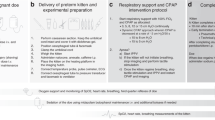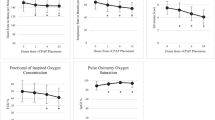Abstract
Summary: Continuous positive airway pressure (CPAP) is used routinely to improve oxygenation in newborns who have intrapulmonary shunts and hypoxemia that is refractory to usual oxygen therapy. Although the cardiovascular and pulmonary effects of CPAP on newborns are well known, little information is available concerning the effect of CPAP on renal function. Therefore, we determined the effect of CPAP (7.5 cm H2O) on urine flow, sodium excretion, and glomerular filtration rate in six newborn goats that were lightly anesthetized with methoxyflurane. CPAP decreased urine flow, sodium excretion, and glomerular filtration rate. CPAP also decreased pulse pressure but did not change mean systemic arterial pressure or heart rate. We conclude that CPAP can impair renal function in newborns without significantly altering renal perfusion pressure.
Speculation: Newborns have a decreased glomerular filtration rate and a decreased ability to excrete sodium loads. Continuous positive airway pressure may further impair renal function in newborns who have the respiratory distress syndrome.
Similar content being viewed by others
Log in or create a free account to read this content
Gain free access to this article, as well as selected content from this journal and more on nature.com
or
Author information
Authors and Affiliations
Rights and permissions
About this article
Cite this article
Fewell, J., Norton, J. Continuous Positive Airway Pressure Impairs Renal Function in Newborn Goats. Pediatr Res 14, 1132–1134 (1980). https://doi.org/10.1203/00006450-198010000-00009
Issue date:
DOI: https://doi.org/10.1203/00006450-198010000-00009



